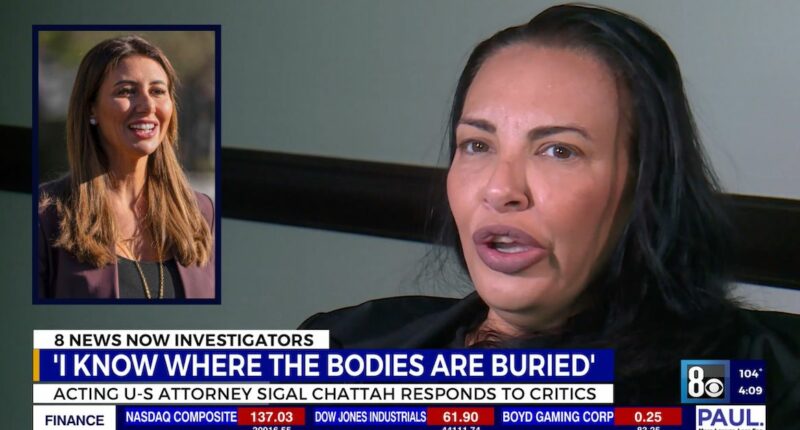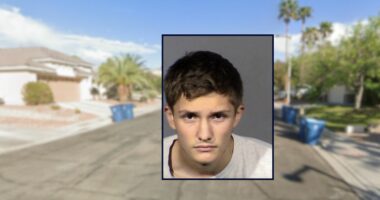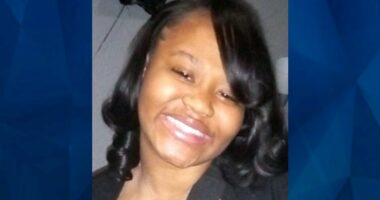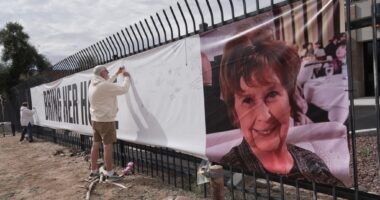Share this @internewscast.com
Left inset: Alina Habba, President Donald Trump’s choice for interim U.S. Attorney for New Jersey, arrives to speak with reporters outside the White House, March 26, 2025, in Washington (AP Photo/Mark Schiefelbein, File). Main: Acting U.S. Attorney Sigal Chattah claims in an early August 2025 news interview that critics of her appointment fear her (KLAS).
An Arizona federal judge, serving by designation in four Nevada criminal cases, has “disqualified” acting U.S. Attorney Sigal Chattah from overseeing the prosecutions, deeming it “unlawful.” This marks the second such defeat for the Trump administration’s DOJ — potentially signaling future developments.
To retain Chattah after her 120-day interim term expired as the top federal prosecutor, bypassing the constitutional requirement for Senate advice and consent on permanent U.S. attorney nominees, U.S. Attorney General Pam Bondi implemented a strategy previously used in New Jersey to reappoint Alina Habba, Trump’s former personal attorney.
Although the situations were distinct, both Chattah and Habba resigned before reaching their interim deadlines and were then appointed as first assistant U.S. attorneys — typically the second in command but, in this context, the acting head. This ostensibly allowed them to “perform the functions and duties of the office temporarily in an acting capacity.” They both sent resignation letters to Bondi expressing their anticipation to “continue leading the U.S. Attorney’s Office.” Additionally, both were designated as a “special attorney” to the AG, granting them authority to act as a U.S. attorney through an alternative role as the office’s supervisor.
The issue for Bondi is that a federal judge recently ruled Habba’s appointment was unlawful, preventing her from managing her challengers’ cases. Similarly, another judge used the Habba case as a precedent to make the same determination regarding Chattah — while at least two other challenges against other acting U.S. attorney appointments are ongoing, with the potential for more.
Criminal defendants Shamar Tyrell Garcia, Giann Icob Salazar Del Real, Devonte Devon Jackson, and Jorge Enriquez, Jr., were not successful in having their indictments dismissed, but they did persuade Senior U.S. District Judge David Campbell to disqualify Chattah.
The judge, a George W. Bush appointee, said the Federal Vacancies Reform Act (FVRA) was enacted by Congress “precisely” to prevent a scenario where a president and AG might attempt to backfill anyone into a top prosecutor role.
“In short, the FVRA is a carefully crafted assertion of Congress’s power under Article II, section 2, clause 2 of the Constitution. Its purpose would be defeated if the Executive Branch – the very branch Congress was trying to constrain – could choose whomever it wanted, whenever it wanted, and fill the vacancy simply by declaring that person to be first assistant,” Campbell said, citing the Habba case and crediting a fellow judge’s ruling that “a ‘first assistant’ who may take office in an ‘acting capacity’ must be the first assistant at the time the vacancy occurs.”
Because Chattah “is not validly serving as Acting U.S. Attorney, her involvement in these cases would be unlawful,” the judge added.
“The Court will disqualify Ms. Chattah from participating in or supervising Defendants’ prosecutions,” Campbell said.
If the Nevada court wants to exercise its authority to name Chattah’s replacement, that’s up to the judges, Campbell said, but the Trump administration has other options, like making an acting U.S. attorney appointment that complies with the law or the nomination of a permanent U.S. attorney while seeking “quick confirmation by the Senate.”
The DOJ is currently appealing the unfavorable ruling in the Habba challenge, and it’s likely the same will happen in Chattah’s case.
For now, Chattah is on notice of her “disqualification” from supervising her challengers’ cases.
“Defendants’ motions are granted to the extent they seek disqualification of Ms. Chattah from supervising their criminal prosecutions. Ms. Chattah is disqualified from supervising these cases or any attorneys in the handling of these cases,” Campbell wrote. “The government attorneys handling these cases shall, within 7 days of this order, file statements in the docket that they are not being supervised by Ms. Chattah in their prosecution of these cases.”
Chattah in recent months defended her appointment as “not unconstitutional” and “not done in a nefarious manner,” according to local CBS affiliate KLAS.
“You know, a lot of these people, I know that they’re scared because I know where a lot of the bodies are buried because I come from the defense world,” Chattah said of her critics. “Without saying too much about my previous experience as a defense attorney, but when you played that side, you know where all the bodies are buried. Sometimes we even choose the location to bury them.”















